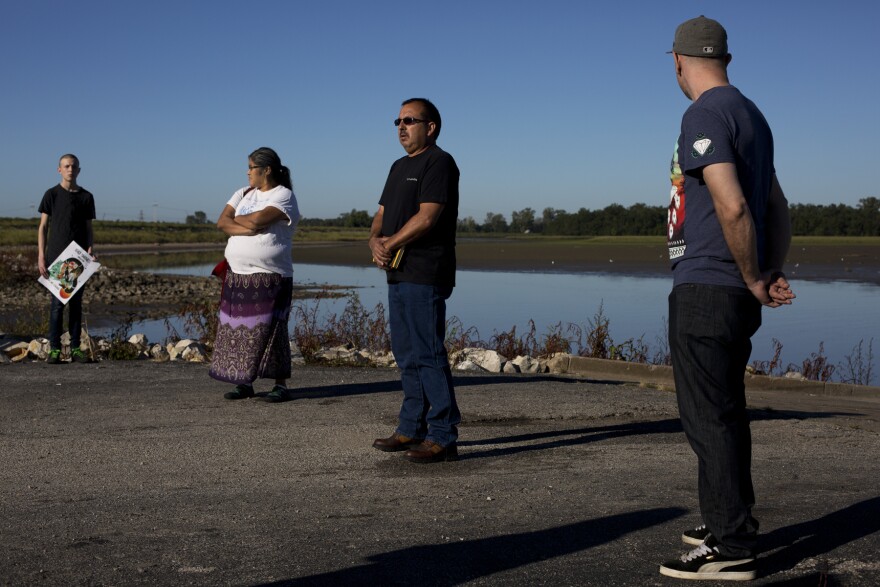Every Sunday morning, Saundi Kloeckener makes her way to the Lincoln Shields Recreation area, just north of where the Mississippi and Missouri rivers meet. Kloeckener, who is of Cherokee and African descent, joins a small group of Native American women to offer prayers for water.
For years, the group has met once a week to perform a traditional Ojibwe water prayer ceremony. Together, they stand at the water's edge to thank it, express gratitude and pray for its protection.
This week, in a show of solidarity with the Standing Rock Sioux tribe and others across the country speaking out against the Dakota Access Pipeline, Kloeckener opened up the sacred ceremony to the public.
"We believe that this water was given to us to take care of," Kloeckener said. "And we need to stand with those people that are trying to protect the water."
The ceremony on Sunday was the second local gathering addressing the Dakota Access Pipeline. Last week, demonstrators gathered in downtown St. Louis to speak out against the pipeline's construction. A protest planned for Wednesday outside KSDK-TV will call on the media and passers-by to acknowledge health and environmental concerns.
“As much as they might say that this is important to jobs up there, it’s important to the companies up there, we’re talking about life and people,” Kloeckener said. “You can’t fix water. The drinking water we have now is all the drinking water that we have. There’s no new drinking water.”

Sunday's ceremony began with smudging, a tradition in which participants are bathed in the smoke of burning sage to cleanse any negative energy. Leaders gathered river water in small copper vessels and handed out pinches of tobacco.

“If you don’t know what to say, just tell the water, ‘Water I love you, water I thank you, water I respect you, and water I pray for you,” Kloeckener instructed. “If you can’t think of anything else, just say an Our Father.”
As participants stood in a large circle, Kloeckener led them through several traditional songs. The vessels moved through the crowd and people spoke or thought their prayers to the water.
Rita McDowell and her aunt, Patricia Winters Isselhardt, drove up as the ceremony was winding down. They had just made the drive back to St. Louis from the Standing Rock Sioux Reservation in North Dakota.
They detailed feeling empowered among the thousands of people gathered there, and expressed disgust for the violent clashes with law enforcement and security personnel earlier this month. Tribal officials said that crews have already destroyed American Indian burial grounds with the pipeline’s construction.

“That’s my family up there," McDowell said through tears. "What killed me the most was them destroying our graves, our burial grounds, our sacred sites. How would anyone else feel if they’re family’s burial grounds were destroyed?”
Basmin Red Deer, a St. Louis native, traveled with McDowell and Isselhardt. She said the pipeline is just another example of indigenous people being disregarded.

“This genocidal program has been going on since the European Invasion. This country was invaded, not discovered. Capitalism was built on stolen land and enslaved labor,” Red Deer said. “It’s time to heal the festering wound on the soul of America and protect the water. Water is life, you can’t drink oil.”
Follow Jenny and Carolina on Twitter: @jnnsmn and @carolinahidalgo


